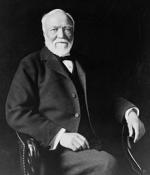Disable ads!
Andrew Carnegie
Carnegie as he appears in the National Portrait Gallery in Washington, D.C. Andrew Carnegie (/kɑrˈneɪɡi/ kar-NAY-gee, but commonly /ˈkɑrnɨɡi/ KAR-nə-gee or /kɑrˈnɛɡi/ kar-NEG-ee; November 25, 1835 – August 11, 1919) was a Scottish American industrialist who led the enormous expansion of the American steel industry in the late 19th century. He was also one of the highest profile philanthropists of his era and, by the time of his death, he had given away to charities and foundations about $350 million (in 2015, $4.76 billion) – almost 90 percent of his fortune. His 1889 article proclaiming "The Gospel of Wealth" called on the rich to use their wealth to improve society, and it stimulated a wave of philanthropy. Carnegie was born in Dunfermline, Scotland, and emigrated to the United States with his very poor parents in 1848. Carnegie started work as a telegrapher and by the 1860s had investments in railroads, railroad sleeping cars, bridges and oil derricks. He accumulated further wealth as a bond salesman raising money for American enterprise in Europe. He built Pittsburgh's Carnegie Steel Company, which he sold to J.P. Morgan in 1901 for $480 million (in 2015, $13.6 billion), creating the U.S. Steel Corporation. Carnegie devoted the remainder of his life to large-scale philanthropy, with special emphasis on local libraries, world peace, education and scientific research. With the fortune he made from business, he built Carnegie Hall and he founded the Carnegie Corporation of New York, Carnegie Endowment for International Peace, Carnegie Institution for Science, Carnegie Trust for the Universities of Scotland, Carnegie Hero Fund, Carnegie Mellon University and the Carnegie Museums of Pittsburgh, among others. His life has often been referred to as a true "rags to riches" story.
 Read more on wikipedia.org Read more on wikipedia.org
 All quotes by Andrew Carnegie All quotes by Andrew Carnegie
 Edit Edit
|

|
|
|
|
|
Background photo by Giuliana
|